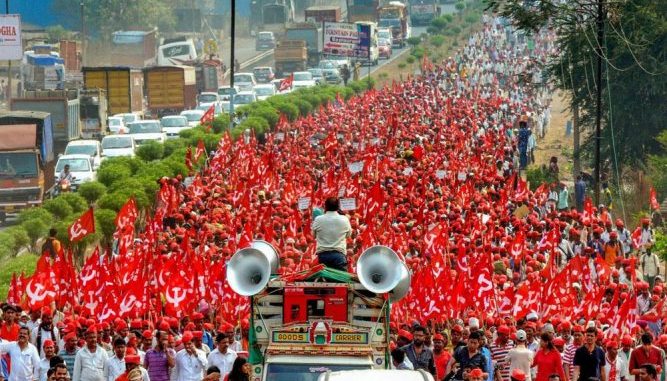
By Markandey Katju
New Delhi: It has been reported that a march by farmers coming from all over India is being planned by the All India Kisan Sangharsh Coordination Committee, an umbrella organisation of several farmers’ bodies, on November 30 in Delhi.
The farmers will march from Ramlila Maidan to Parliament. The demand of the agitators is for a three-week session of Parliament to waive off farmers debts and implement the Swaminathan Committee Report for fixing remunerative prices for agricultural products (the committee had recommended minimum support price to be 50 per cent above the cost price).
I fear that this farmers ‘long march’ will only end in a bloody fiasco, by a ‘whiff of grapeshot’ as was done by Napoleon’s troops in Paris in October 1795, or as on ‘Bloody Sunday’ in St. Petersburg, Russia, in January 1905, or in North Ireland in 1972. The leaders of the farmers’ march are behaving like Father Gapon (who led the Russian march, but was later revealed to be a police agent and killed), leading people to massacre.
In my opinion, the farmers’ basic demand of remunerative prices can never be met within the present political system. Let me explain why.
Farming has largely become uneconomical in India because of two reasons: (1) the high costs of inputs like fertilisers, pesticides, electricity and labour and (2) middlemen taking away most of the profit.
Agricultural products have to be sold above the cost price. But the system prevalent in most parts of India is that a businessman comes to the farmers at the end of harvest and offers to buy their product at a very low price. Most farmers, who are small cultivators, have no option but to sell at a low price. Then, this businessman takes the product to a city and sells it to a wholesaler at a much higher price. The wholesaler, in turn, sells it to a retailer at a still higher price. Then, the retailer sells it to the consumer, making his profit too.
Thus, the bulk portion of the price at which the product is sold is pocketed by middlemen, and does not go to the farmer, who gets a pittance. This is the reason for suicides by over 3 lakh farmers in India, and the sight of farmers dumping their produce on roads.
What, then, is the way out? I am afraid there is none within the present system.
Modern farming, whether of the capitalist kind or the socialist kind, is done on large farms. For instance, in countries in America or Europe, most farms are of a thousand acres or so. Farming in these countries is done by modern implements like tractor, harvester, combine and even aircraft (for spraying pesticides). In fact, agriculture in Western countries is a capital-intensive industry and is very different from feudal agriculture, which was done by bullocks or horses.
Socialist agriculture is done on collective farms, whereas capitalist agriculture is done on private farms. It is only in large-scale farming, whether of the socialist kind or the capitalist kind, that modern methods of agriculture can be used, which result in increasing production considerably. And with our huge population of 1.32 billion people, we need more food. Hence, we must have modern farming.
In most states in India, there are agricultural holding ceiling laws. For instance, the Uttar Pradesh Imposition of Ceiling on Land Holdings Act, 1960, had fixed a maximum ceiling of owning land at 16 hectares. In my opinion, such laws, far from being progressive, are reactionary, for modern agriculture cannot be done on such small holdings.
We have to, therefore, do serious thinking in this connection. If we opt for capitalist agriculture, what will happen to the millions of peasants who will become unemployed, for capitalist agriculture relies more on machinery than human labour. In Western countries, the peasants who became unemployed due to the development of capitalist agriculture got employment in the rapidly growing industries, but where are the industries in India today to absorb them? On the other hand, socialist agriculture (in collective farms) requires a different political system in India.
Our patriotic intelligentsia must now use their creativity to solve this vital problem. Marches to Parliament are no solution.
Source: THE WEEK

Leave a Reply